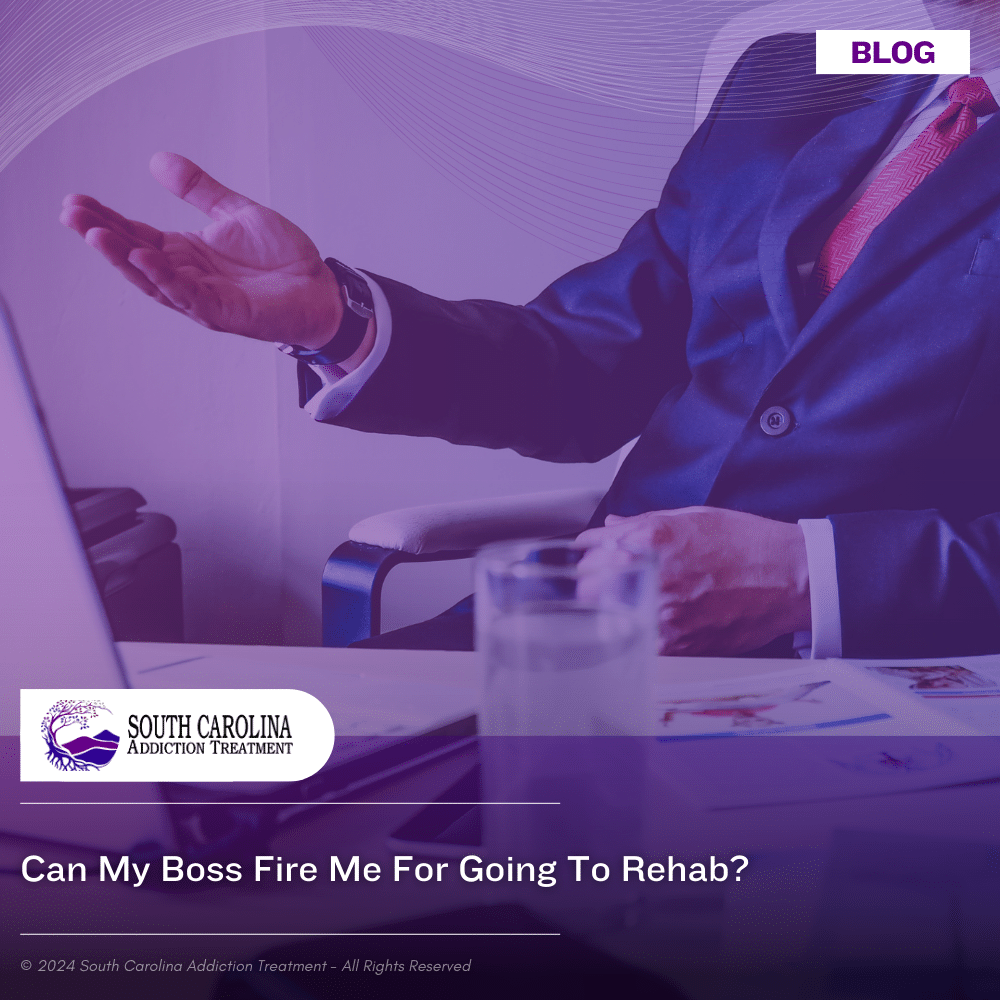Can My Boss Fire Me For Going to Rehab?

Medically Verified: 2/1/24
Medical Reviewer
Chief Editor

All of the information on this page has been reviewed and verified by a certified addiction professional.
Heavy, prolonged drug or alcohol abuse can cause lasting changes in how a person’s brain and body function. Some of these changes can make it difficult for people to stop abusing substances without professional treatment and ongoing support.
The harm done by drug and alcohol abuse can be significant. People may experience severe medical complications, relationship difficulties, legal and financial trouble, and more. But even though the effects of addiction are often devastating, very few people–about 1 in 10–get the help they need to overcome it.
Several barriers can prevent people from getting treatment when they need it. People may worry about the stigma surrounding addiction, have concerns about leaving their family for an extended period, or wonder how they’ll pay for treatment.
One of the most common concerns among people who need addiction treatment is the fear of losing their job. It can be hard to imagine taking time away from work to get treatment, but this necessary step will ensure you can live a healthy, fulfilling life in recovery.
Several laws protect people from being fired for seeking mental health or addiction treatment. Understanding your rights may help you feel more confident when seeking the life-saving treatment you need and deserve.
Reach out to the South Carolina Addiction Treatment staff to learn about the laws protecting people in rehab or explore our comprehensive treatment programs.
Substance Abuse and Work: Understanding the Problem
While many people may imagine those living with drug and alcohol addiction to be unemployed and at rock bottom, this is not an accurate picture of substance abuse. In fact, the majority of people with a substance use disorder are employed–and somewhere between 10 and 25% of people in the workforce struggle with substance use.
Without treatment, substance abuse and addiction can cost employers and communities quite a bit in lost productivity and workplace problems.
Some of the most common issues that arise when employees struggle with addiction include:
- Work disruption
- Interpersonal conflict
- Accidents and injuries
- Frequent absences
People who work while abusing drugs and alcohol are more likely to hurt themselves or others and have higher incidents of workplace conflicts and violence. Others working with addicted people may become resentful if they have to pick up the slack or cover for frequent absences.
Substance abuse in the workplace is a significant issue that can impact entire organizations and communities. Employers are often supportive of employees who seek treatment because it can lead to increased morale and productivity.
Can My Boss Fire Me For Going to Rehab?
While many employers are supportive of employees who seek addiction treatment, your boss doesn’t have to be supportive for you to get the help you need. Several laws in place protect your employment while you participate in substance abuse treatment.
Here is a quick overview of the laws that protect your employment during rehab.
The Family and Medical Leave Act (FMLA)
The Family and Medical Leave Act, or FMLA, is one of the most significant laws protecting your employment during addiction rehab. This law allows you to take a leave of absence for up to 12 weeks so that you can get addiction or mental health treatment.
Employees who meet specific criteria will be eligible to take time away from work without worrying about losing their jobs. These criteria include:
- Your company must have at least 50 employees
- You must have been employed for at least 12 consecutive months and must have worked at least 1250 hours before taking a leave of absence
- You must be enrolled in a professional treatment program during your leave of absence
If you meet these criteria, you will likely be allowed to take up to 12 weeks away from work to participate in treatment without fear of losing your job.
Americans with Disabilities Act (ADA)
The Americans with Disabilities Act, or ADA, prevents discrimination against employees with drug and alcohol addiction. The ADA allows people to work on an altered schedule that will enable them to attend medical and mental health appointments, 12-step meetings, testing, and other recovery-related activities. The ADA may also offer job protection if you choose to attend drug and alcohol rehab.
The Rehabilitation Act of 1973
The Rehabilitation Act of 1973 offers additional job protection for applicants and employees against discrimination based on disability. This law applies to certain federal employees.
Health Insurance Portability and Accountability Act (HIPAA)
HIPAA protects the confidentiality of your medical and mental health information and prohibits your employer from accessing your medical information without your consent.
Speak to your Human Resources representative to determine whether you are eligible for a leave of absence to attend treatment. Knowing these laws can help you feel more confident advocating for yourself to get the help you need.
Find Help Now
If you or someone you love struggles with substance abuse or addiction and needs treatment, you are not alone. Learn more about getting the treatment you need without losing your job by contacting the South Carolina Addiction Treatment specialists now. Our admissions team will help you navigate this process and offer support at each step. Call now to learn more.

